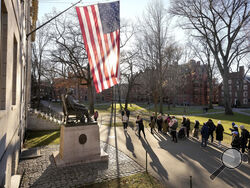BOSTON (AP) — Several Jewish students have filed a lawsuit against Harvard University, accusing it of becoming “a bastion of rampant anti-Jewish hatred and harassment.”
The lawsuit filed Wednesday mirrors others filed since the Oct. 7 Hamas attack on Israel, including against The Art Institute of Chicago, New York University and the University of Pennsylvania.
In the Harvard lawsuit, the plaintiffs include members of the Students Against Antisemitism, Inc. They accuse Harvard of violating Jewish students' civil rights and allege that the university tolerated Jewish students being harassed, assaulted and intimidated — behavior that has intensified since the Oct. 7 attack.
"Mobs of pro-Hamas students and faculty have marched by the hundreds through Harvard’s campus, shouting vile antisemitic slogans and calling for death to Jews and Israel," according to the lawsuit. “Those mobs have occupied buildings, classrooms, libraries, student lounges, plazas, and study halls, often for days or weeks at a time, promoting violence against Jews.”
It was unclear what the reference to mobs in the lawsuit refers to, but the university has been rattled by protests since the Oct. 7 attack. At one point, pro-Palestinian students occupied a campus building for 24 hours.
Marc Kasowitz, a partner at the law firm that brought the suit, Kasowitz Benson Torres, said in a statement that the litigation was necessary because Harvard would not “correct its deep-seated antisemitism problem voluntarily."
“Harvard must be forced to protect its Jewish students and stop applying a double standard when it comes to anti-Jewish bigotry,” he added.
A spokesman for Harvard said the school doesn't comment on pending litigation. About a dozen students are potentially facing disciplinary charges for violations of protest rules related to pro-Palestinian activities, but the spokesman said the school couldn't comment on their cases.
Fallout from the Israel-Hamas war has roiled campuses across the U.S. and reignited a debate over free speech. College leaders have struggled to define the line where political speech crosses into harassment and discrimination, with Jewish and Arab students raising concerns that their schools are doing too little to protect them.
The issue took center stage in December when the presidents of Harvard, Penn and MIT testified at a congressional hearing on campus antisemitism. Asked by Republican lawmakers whether calls for the genocide of Jews would violate campus policies, the presidents offered lawyerly answers and declined to say unequivocally that it was prohibited speech.
Their answers prompted weeks of backlash from donors and alumni, leading to the resignation of Liz Magill at Penn and Claudine Gay at Harvard.
Hamas’ Oct. 7 attacks killed 1,200 people in Israel, mainly civilians, and abducted around 250 others, nearly half of whom were released during a weeklong cease-fire in November.
Since the war began, Israel’s assault in Gaza has killed more than 23,200 Palestinians, roughly 1% of the territory’s population, and more than 58,000 people have been wounded, according to the Health Ministry in Hamas-run Gaza. About two-thirds of the dead are women or children.
The U.S. Department of Education has repeatedly warned colleges that they are required to fight antisemitism and Islamophobia on their campuses or risk losing federal money. Education Secretary Miguel Cardona said the agency has opened more than 40 investigations at colleges and universities in response to complaints of antisemitism and Islamophobia since the Oct. 7 attacks, including at Harvard, Stanford and MIT.
“No student should feel unsafe on campus,” Cardona told The Associated Press on Wednesday, after he met with students. “The Office for Civil Rights takes these cases very seriously. They investigate harassment, or violations for antisemitism, Islamophobia, anti-Arab sentiment. We take that role very seriously. If any student on campus feels that any protest or messaging makes them feel unsafe, we ask for an investigation.”
In November, Gay issued a memo laying out plans to address antisemitism on campus.
The university said it was starting a process to examine “how antisemitism manifests within our community" and developing a plan to address it. It also is implementing a program to educate students and faculty about antisemitism and “redoubling our efforts to make students aware that appropriate avenues exist to report feelings of fear or incidents causing harm” including an anonymous hotline for bias incidents.

